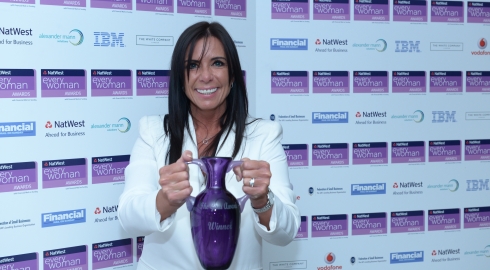Even among women who stand out, Claudette Deysel is no ordinary woman. Claudette, who trained in both psychology and criminology, is the founder and chief executive of Benjamin UK, a company providing residential care and treatment to children with mental health problems whose behaviour and early life experiences risk them ending up in the court and care systems.
Benjamin UK, founded in 2004, now runs six residential care homes in four counties and three more are in the pipeline. Claudette’s passionate advocacy of the rights of vulnerable children, put into practice through her growing business, resulted in her being named winner of the NatWest everywoman Gaia Award for a woman running a business with a clearly defined social or ethical purpose.
Here Claudette talks about the benefits the award will bring to Benjamin UK, herself and, most importantly, the children.
“When you are in the field of severe childhood trauma the term ‘business’ seems out of place,” says Claudette, “so when our investors pressed for me to be put forward for a business award – even this one – I hesitated.” But finally she agreed to enter because she felt that the award not only recognised sustainable, ethical businesses but more importantly, that winning could help raise the profile of children in residential care in a positive way.
“I want the award to help raise awareness of the real child behind each child in care. These children are the most vulnerable people in society,” she says.
They certainly need some positive publicity. These are children whose traumatic experiences have led them to end up in the care system as looked after children.
“There is a stigma attached to children in care. They are marginalised. No-one wants them living nearby,” says Claudette.
But people fail to see the extra skills and resilience that these children can show. “They can be pretty amazing once they gain a sense of belonging and start to turn their lives around. The experiences that resulted in their behavioural problems can ultimately make them much more mature than other children and help build up integrity and character.”
Claudette trained as a criminologist in South Africa and then lectured in penology at the University of South Africa and art at Her Majesty’s Young Offender Institute, Aylesbury, Buckinghamshire.
In 2012 she completed a masters degree in criminology, penology and management at Cambridge University and received the Cathleen McDermott Prize for her research on how traumatised children think about and deploy violence.
Her background has convinced her that the kind of behaviour sometimes resulting from childhood trauma or mental health problems should be seen as a welfare issue. “However, it’s often treated as a criminal justice issue, even when the child is suffering from post-traumatic stress disorder or schizophrenia, and the children often end up in care homes where staff are not trained to deal with these issues which result in their further criminalisation,” she says.
Determined to change this, she devised an evidence-based treatment plan to help these children improve their lives. Each Benjamin UK care home is run like a family home, where children have a settled way of life that for some may be at odds with previously chaotic lives. Many are in bed by 10pm, have a routine that includes fixed mealtimes and have to earn their pocket money by doing chores.
Benjamin employs 72 staff, including graduates of psychology and criminology, and vocationally trained staff. “We deliberately employ people of all ages, including parental figures that the children can look up to, and people from diverse backgrounds,” says Claudette.
The organisation also works with the children’s parents, friends and statutory agencies. “Some children come to us just wanting to die, but we have seen many success stories where children have returned to their homes, obtained jobs, and gone on to have their own children,” she says. Some children have used their life experiences to mentor others.
Reflecting on winning the NatWest everywoman Gaia Award, Claudette says: “I am proud that we have won it. It has reinforced my confidence in my business skills and recognises the time spent nurturing my staff.”
The award also brings recognition of her therapeutic system. “As a chief executive you are not often acknowledged for the systems you devise, but this award feels like a pat on the back, because someone recognised the value of mine,” she says.
Claudette is determined to ensure that the business remains sustainable and the outcomes for children remain outstanding so as to increase capacity and maximise social investment return.
But Claudette feels the true value of the award will be in encouraging a more positive view of looked after children. She says: “I want the award to help give a voice to looked after children. We need to break down the prejudice against them and get the public on board to accept these vulnerable children in the community.”
The 2014 NatWest everywoman Awards are now open for nominations – so make sure you nominate today >>





